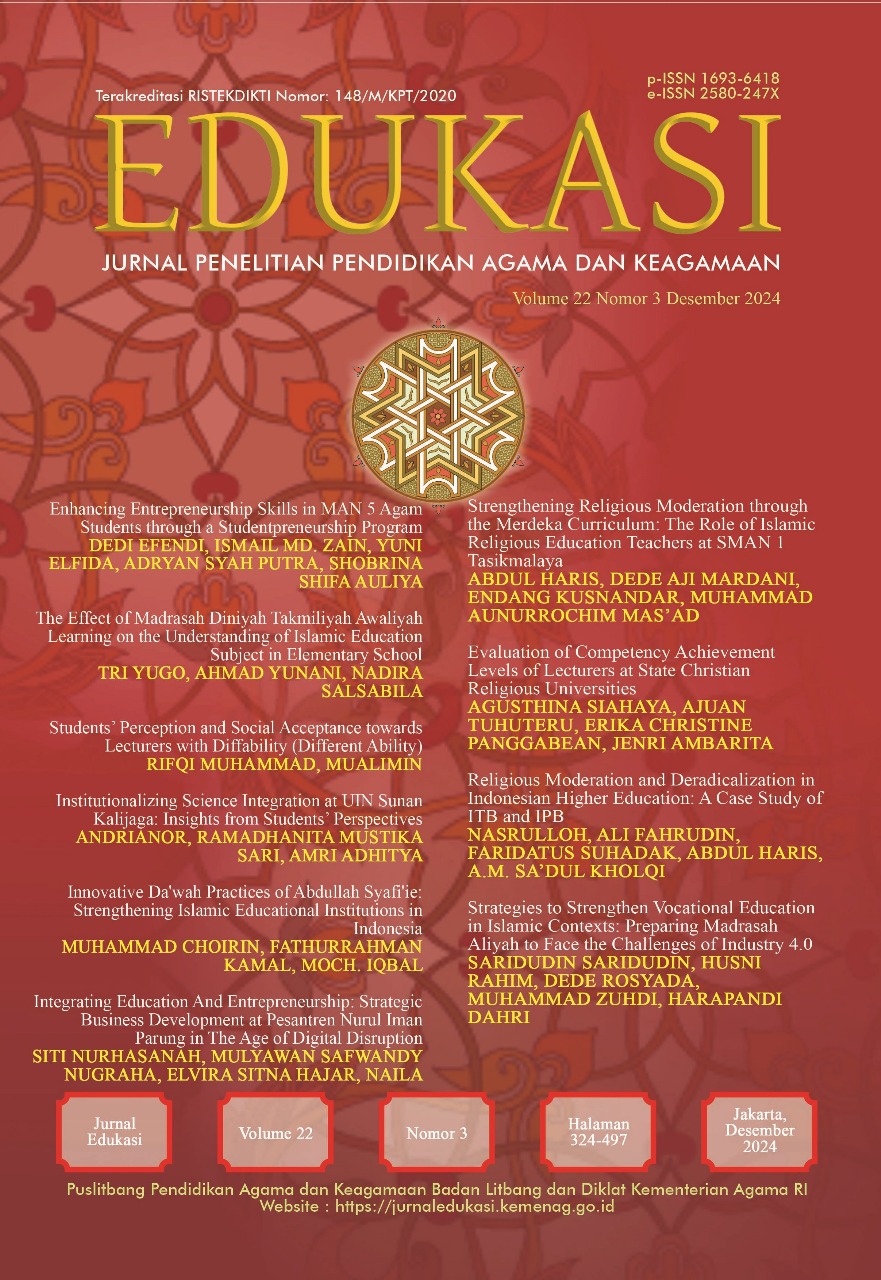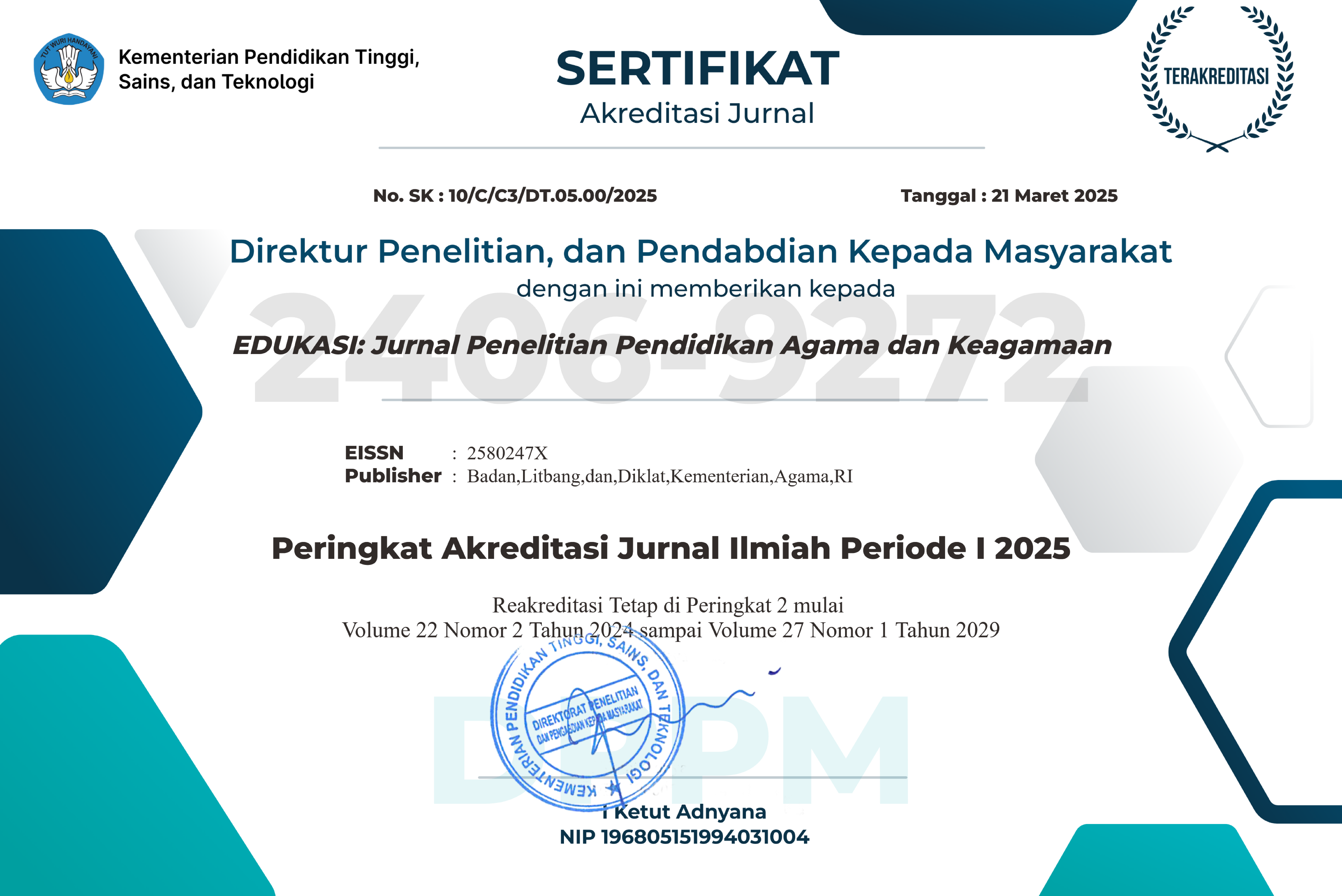Integrating Education and Entrepreneurship: Strategic Business Development at Pesantren in the Era of Digital Disruption
DOI:
https://doi.org/10.32729/edukasi.v22i3.1926Keywords:
Business Development, Business Strategy, Digital Transformation, Entrepreneurship Education, PesantrenAbstract
This study aims to conduct an in-depth analysis of business development strategies carried out in various business units in the Pesantren Nurul Iman Parung Bogor in the era of digital disruption. This study uses qualitative descriptive research methods, with data collection methods through observation, interviews, and document collection related to the focus of the research. Data analysis includes data reduction, display, and conclusion drawing/verification. The business development strategy of Pesantren Nurul Iman Parung Bogor follows four key steps aligned with their entrepreneurial practices. First, focus on business idea development by recycling waste to create new opportunities and generate revenue. Second, expand business scale by increasing machine capacity, workforce, and investment capital, as shown by the establishment of 26 business units. Third, expand business scope by opening new locations and developing different types of businesses, such as the Active Carbon and Nurul Iman Animation ventures. Lastly, they pursue expansion through partnerships, collaborating with PT. Asj Indonesia and the Ministry of Industry to create new business units. These strategies form the foundation of their business growth, emphasizing capacity building and diversification to ensure economic sustainability. This research highlights the potential of pesantren-based business models in encouraging economic sustainability by integrating entrepreneurial practices into pesantren operations. This research is also a reference to promote the development of policies supporting entrepreneurship education integration in faith-based educational institutions. This Pesantren is a concrete example of how collaboration between academic institutions, the industrial sector, and the government can create an educational ecosystem oriented toward economic sustainability.
Downloads
References
Ahmad, D. (2013). Pengembangan ekonomi pada lima pesantren Kabupaten Lamongan, Jawa Timur. Edukasi: Jurnal Penelitian Agama dan Keagamaan, 11(06), 113–128. https://dx.doi.org/10.32729/edukasi.v11i1.429
Alifiyah, N., & Budiman, A. (2021). Strategi pengembangan usaha melalui bisnis model canvas kerajinan tenun Pondok Pesantren Al-Falah Ploso, Mojo, Kediri. Jurnal Cakrawala Ilmiah, 1(3), 295. https://doi.org/10.53625/jcijurnalcakrawalaindonesia.v1i3.610
Al-Tarawneh, A., et al. (2024). Uncertain supply chain management: The impact of strategic and innovativeness entrepreneurship and social capital on business overall performance through building a sustainable supply chain management at Jordan private universities. Uncertain Supply Chain Management, 12, 65–76. https://www.growingscience.com/uscm/vol12/uscm_2023_197.pdf
Angelina, P., Kartadinata, S., & Budiman, N. (2021). Kompetensi pedagogis guru di era disrupsi pendidikan dalam pandangan Islam. Ta’dibuna: Jurnal Pendidikan Islam, 10(2), 305. https://doi.org/10.32832/tadibuna.v10i2.4863
Barro, R. J., & Lee, J.-W. (2021). Human capital and growth: Theory and evidence. Review of Economic Studies, 88(1), 157–183.
Benitez, J., Ray, G., & Henseler, J. (2018). Impact of information technology infrastructure flexibility on mergers and acquisitions. MIS Quarterly, 42(1), 25–43.
Bocken, N. M. P., et al. (2016). Product design and business model strategies for a circular economy. Journal of Industrial and Production Engineering, 1015, 1–12. http://dx.doi.org/10.1080/21681015.2016.1172124
Bryson, M. (2018). Strategic planning for public and nonprofit organizations (5th ed.). John Wiley & Sons.
Budiarta, K. (2009). Pengantar bisnis. Jakarta: Mitra Wacana Media.
Fauziah, N., & Rahman, T. (2023). Peningkatan kompetensi bahasa asing di pesantren: Studi kasus di era globalisasi. Jurnal Pendidikan Berbasis Karakter, 15(1), 75–88.
Fayolle, A. (2013). Personal views on the future of entrepreneurship education. Entrepreneurship & Regional Development, 25, 692–701.
Ford, B. R., Bornstein, J. M., & Pruitt, P. T. (2008). The Ernst & Young business plan (Terjemahan). I. Andriani (Ed.). Jakarta: PT Cahaya Insani Suci.
Ford, B. R., J. M. B., & Pruitt, P. T. (2008). The Ernst & Young business plan (Ed. Terjemahan). I. Andriani (Ed.). PT Cahaya Insani Suci.
Ghazali, A. R. (2022). Pesantren dan tantangan ekonomi di era disrupsi: Penguatan kemandirian ekonomi pesantren. Jurnal Ekonomi Islam Indonesia, 10(2), 35–47.
Gibson, J. L., Ivancevich, J. M., & Donnely, J. H. (2017). Organisasi: Perilaku struktur, proses (Terjemahan). Edisi Dela. Jakarta: Aksara, Binarupa.
Harmaizar. (2003). Menangkap peluang usaha. Bekasi: CV Dian Anugerah Prakasa.
Hassan, R., & Tan, M. L. Islamic boarding schools and social entrepreneurship: Fostering innovation and community development. Journal of Social Innovation in Education, 15(3), 120–140.
Howkins, J. (2013). The creative economy: How people make money from ideas (2nd ed.). Penguin Books.
Huda, H., & Yani, A. (2024). Integrating science and religion through academic writing: A case study at MAN Insan Cendekia. Edukasi: Jurnal Penelitian Agama dan Keagamaan, 22(2), 167–183.
Husein, W. M. (2022). Disrupsi pendidikan di era new normal jenjang pendidikan dasar. Jurnal Pendidikan dan Konseling, 4, 1349–1358. https://journal.universitaspahlawan.ac.id/index.php/jpdk/article/view/5449
Idah, Y. M., & Pinilih, M. (2020). Strategi pengembangan digitalisasi UMKM. Prosiding Seminar Nasional dan Call for Papers “Pengembangan Sumber Daya Pedesaan dan Kearifan Lokal Berkelanjutan IX, 9(1), 195–204.
Irfan, S., & Roesminingsih, M. V. (2024). Crafting an entrepreneurship strategic planning model for Islamic boarding schools through a comprehensive literature review. 5(1), 42–63.
Jamaluddin, M. (2012). Metamorfosis pesantren di era globalisasi. Karsa: Journal of Social and Islamic Culture, 127–139. https://ejournal.iainmadura.ac.id/karsa/article/view/57
Kukartsev, V., Shutkina, E., Moiseeva, K., Korpacheva, L., & Kireev, T. (2022). Methods and tools for developing an organization development strategy. IEEE International IOT, Electronics and Mechatronics Conference (IEMTRONICS), Toronto, 1–6. https://doi.org/10.1109/iemtronics55184.2022.979570
Kurniawan, R., & Lionardo, A. (2020). Model pemberdayaan santri Pondok Pesantren Al-Furqon Kota Prabumulih melalui kewirausahaan. Islamic Insights Journal, 2(2), 83–94. https://doi.org/10.21776/ub.iij.2020.002.02.02
Maftuhah, & Nurhasanah, S. (2023). SWOT analysis of development strategy entering the disruption era. Tarbiya: Journal of Education in Muslim Society, 10(1), 57–68. http://dx.doi.org/10.15408/tjems.v10i1.33399
Mair, J., & Martı, I. (2019). Social entrepreneurship research: A source of explanation, prediction, and delight. (February 2006).
Matzembacher, D. E., Raudsaar, M., & Barcellos, M. D. (2020). Business models’ innovations to overcome hybridity-related tensions in sustainable entrepreneurship. Sustainability, 12(11), 4503. https://doi.org/10.3390/su12114503
Miles, M. B., Huberman, A. M., & Saldaña, J. (2014). Qualitative data analysis: A methods sourcebook. Thousand Oaks, CA: SAGE Publications.
Moleong, L. (2021). Metodologi penelitian kualitatif. Bandung: Remaja Rosdakarya.
Morris, W., Henley, A., & Dowell, D. (2017). Farm diversification, entrepreneurship and technology adoption: Analysis of upland farmers in Wales. Journal of Rural Studies, 53, 132–143. http://dx.doi.org/10.1016/j.jrurstud.2017.05.014
Muhammad, A. (2017). Strategi pengembangan usaha roti Tanjong di Kecamatan Samalanga Kabupaten Bireuen. Jurnal S. Pertanian, 1(3), 223–224. https://www.neliti.com/publications/210812/strategi-pengembangan-usaha-roti-tanjong-di-kecamatan-samalanga-kabupaten-bireue
Mu’awwanah, U., Mardiyah, A., & Utami, A. S. (2021). Penguatan halal value chain dalam pemasaran abon lele melalui adaptasi digital. Mujtama’: Jurnal Pengabdian Masyarakat, 1(1), 65–73. http://jurnal.unmuhjember.ac.id/index.php/mujtama/article/view/5134
Muhammad, A. (2017). Strategi pengembangan usaha roti Tanjong di Kecamatan Samalanga Kabupaten Bireuen. Jurnal S. Pertanian, 1(3), 223–224. https://www.neliti.com/publications/210812/strategi-pengembangan-usaha-roti-tanjong-di-kecamatan-samalanga-kabupaten-bireue
Muhyiddin, D. S., Ahmad, N., Suhartini, A., Ahyani, H., & Mutmainah, N. (2022). Community economic empowerment through the ‘One Pesantren One Product’ program at Pagelaran III Islamic Boarding School, Subang, Indonesia. Journal of Islamic Economics Lariba, 8(1), 101-122. https://doi.org/10.20885/jielariba.vol8.iss1.art7
Muliawaty, L. (2019). Manajemen inovasi di era disrupsi. Bandung: Penerbit Alfabeta.
Murtadlo, M., & Basri, H. H. (2022). Pendidikan life skills dan pemberdayaan ekonomi. Edukasi: Jurnal Penelitian Agama dan Keagamaan, 20(3), 262–278.
Nurhasanah, S. (2023a). Statistika pendidikan. Jakarta: Salemba Diniyah.
Nurhasanah, S., & Maftuhah. (2023b). Strategi pengembangan usaha di Pondok Pesantren Nurul Iman Parung: Perspektif pendidikan Islam di era disrupsi. Edukasi Islami: Jurnal Pendidikan Islam, 12(4), 3219–3232.
Nurhasanah, S., et al. (2022). Metodologi penelitian kuantitatif dan kualitatif. Jakarta: Edu Pustaka.
Pollack, S. (2015). What, exactly, is business development? Harvard Business Review. https://hbr.org
Porter, M. E., & Kramer, M. R. (2011). Creating shared value: How to reinvent capitalism and unleash a wave of innovation and growth. Harvard Business Review, 1(2), 62–77.
Prayitno, P. (2016). Pemberdayaan sumber daya santri melalui entrepreneurship di Pondok Pesantren Al-Ashriyyah Nurul Iman Islamic Boarding School Parung Bogor. Quality, 4(2), 310–331.
Rahmawati, F. (2018). Kecenderungan pergeseran pendidikan agama Islam di Indonesia pada era disrupsi. Jurnal Tadris, 13(2).
Rumelt, R. P. (2011). Good strategy bad strategy: The difference and why it matters. Crown Business.
Sarasvathy, S. D. (2001). Causation and effectuation: Toward a theoretical shift from economic inevitability to entrepreneurial contingency. Academy of Management Review, 26(2), 243–263. https://doi.org/10.5465/amr.2001.4378020
Ser, J., et al. (2014). Environmental impacts of large-scale oil palm enterprises exceed that of smallholdings in Indonesia. 7(February), 25–33.
Setiawan, H., Rahman, F., & Zulkarnain, M. (2023). Pendidikan kewirausahaan berbasis pesantren: Inovasi dan tantangan. Jurnal Ilmiah Manajemen Pendidikan, 21(2), 102–115.
Sugiyono. (2017). Metode penelitian pendidikan: Pendekatan kuantitatif, kualitatif, dan R&D. Bandung: Alfabeta.
Sugiarti, D. Y. (2011). Membangun peradaban Muslim di Indonesia. Edukasi, 3, 8–37.
Suwendi, S. (2020). Pendidikan kewirausahaan di Pondok Pesantren Al-Ashriyyah Nurul Iman Parung Bogor. Atthulab: Islamic Religion Teaching & Learning Journal, 5(2), 148–165.
Syamsuri, S. (2020). Strategi pengembangan ekonomi berdikari di Pesantren Gontor berbasis pengelolaan kopontren. Al-Intaj: Jurnal Ekonomi dan Perbankan Syariah, 6(1), 37.
Teece, D. J. (2016). Dynamic capabilities and entrepreneurial management in large organizations: Toward a theory of the (entrepreneurial) firm. European Economic Review, 86, 202–216.
Thalib, M. A. (2022). Pelatihan analisis data model Miles dan Huberman untuk riset akuntansi budaya. Madani: Jurnal Pengabdian Ilmiah, 5(1), 23–33.
Wilden, R., Devinney, T. M., & Dowling, G. R. (2016). The architecture of dynamic capability research: Identifying the building blocks of a configurational approach. Academy of Management, 10(1), 997–1070. https://journals.aom.org/doi/full/10.5465/19416520.2016.1161966Wirtz, B. W., Pistoia, A., Ullrich, S., & Göttel, V. (2016). Business models: Origin, development and future research perspectives. Long Range Planning, 49(1), 36-54. https://doi.org/10.1016/j.lrp.2015.04.001
World Economic Forum. (2020). Schools of the future: Defining new models of education for the fourth industrial revolution.
Yoshida, D. T. (2004). Arsitektur strategik: Sebuah solusi meraih kemenangan dalam dunia yang senantiasa berubah. Jakarta: PT Elex Komputindo Kelompok Gramedia.
Zaini, M. (2014). Strategi pengembangan pondok pesantren melalui usaha kecil masyarakat. Jurnal Kependidikan Islam, 4(20), 175–199. https://doi.org/10.15642/jkpi.2014.4.1.175-199
Downloads
Published
Issue
Section
License
Copyright (c) 2024 Siti Nurhasanah Yahya, Mulyawan Safwandy Nugraha, Elvira Sitna Hajar, Neila Aisha

This work is licensed under a Creative Commons Attribution-ShareAlike 4.0 International License.









